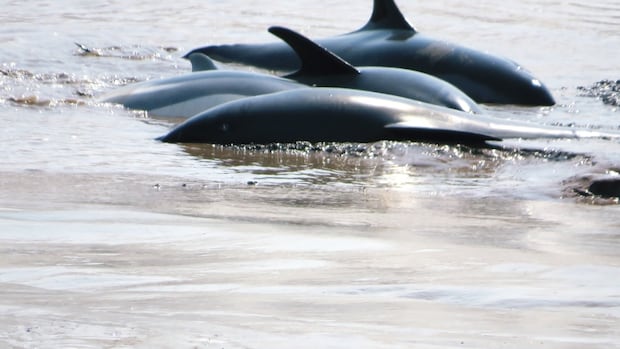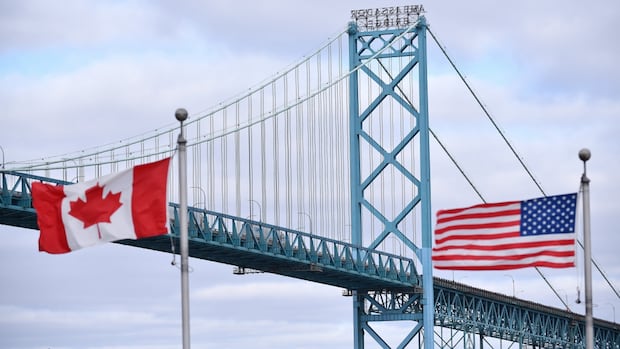After U.S. President Donald Trump took office, sociologist Travers — who goes by one name — nixed plans to attend the North American Society for the Sociology of Sport (NASSS) conference in Seattle this November.
Travers, an associate professor at Simon Fraser University in Burnaby, B.C., is the president-elect of NASSS. But as a trans person, they are wary of visiting the U.S. at a time when the Trump administration is rolling back transgender rights.
“[I] will not be travelling to the United States right now because it feels very dangerous to do so,” said Travers.
The sociologist soon realized the problem was widespread: around 40 per cent of NASSS’s 600 members live in Canada, and many of them reported that they, too, don’t want to attend the Seattle conference, due to reports of increased scrutiny at the U.S. border, Trump’s trade war and his threats to annex Canada.
“If we were to just hold the conference in Seattle, it would be significantly under-attended,” Travers said of the annual conference where NASSS members meet and share research about the sociological study of sport.
Because breaking the venue contract would be cost-prohibitive, organizers came up with a creative solution: a pared-down Seattle conference with an added tandem one in Vancouver. Some events will take place in both locations, courtesy video conferencing.
“I have certainly heard back from many NASSS members who said, ‘Thank you, thank you. I was afraid to go to the United States,'” said Travers.
NASSS isn’t alone in changing its conference plans since Trump took office. CBC News has identified three North American-based organizations that recently relocated upcoming conferences — either partially or fully — from the U.S. to Canada. In a fourth case, organizers chose Canada, knowing many of its Canadian participants won’t go to the U.S.
Travel to the U.S. from several countries has dropped recently, with Canada leading the pack: in March, the number of return trips among Canadians travelling to the U.S. plummeted by 13.5 per cent for air travel, and by a whopping 32 per cent for land travel.
Professor interrogated at U.S. customs
While the low Canadian dollar has deterred some travellers, the political climate in the U.S. and Trump’s hardline crackdown on immigration has fuelled much of the decline.
“After Trump was voted in office, I know that my members have very little interest in attending a conference in the U.S.,” said Dr. Jason Karamchandani, president of the Canadian Association of Pathologists (CAP).
So organizers for a 2026 joint conference between CAP and the American Society for Clinical Pathology chose a Montreal venue — even though the American group has six times more members.
“There have been stories of people facing challenges entering the United States,” said Karamchandani.
Those stories include the 11-day detainment of Canadian Jasmine Mooney in March. A French scientist was denied entry that same month, because U.S. customs officers found anti-Trump messages on his phone, according to the French government.
Sociologist and NASSS member Nathan Kalman-Lamb also had an incident at U.S. customs in March, at Montreal’s Trudeau International Airport, as he was heading to a conference at the University of South Carolina.
Kalman-Lamb, a Canadian citizen, says despite having all the right documentation, including an invite from the university, a U.S. Customs and Border Protection (CBP) officer interrogated him and searched his possessions, including his phone and wallet.

“To be subject to these kind of searches and the seemingly arbitrary authority of basically police officers in these spaces, it’s beyond disquieting. It’s frightening,” said Kalman-Lamb, an assistant professor at the University of New Brunswick.
He says three hours later, the officer allowed him to continue on his journey. However, by this time, he had missed his flight and had to rebook it. He says no one explained why he had been targeted, so he’s sworn off U.S. travel for now.
“I don’t even think for research I can justify at this point taking the risk of travelling to the United States,” he said.
Kalman-Lamb says he was thrilled when he learned he won’t miss the upcoming NASSS conference, which he will now attend in Vancouver.
U.S. CBP spokesperson Jessica Turner told CBC News in an email that all travellers are subject to inspection upon entry.
She also said Trump’s border crackdown is designed to protect the country and that “lawful travellers have nothing to fear from these measures.”
Conferences pull the plug on U.S. venues
Despite CBP’s reassurances, some conferences that already booked a U.S. location have decided to scrap the venues entirely.
Work and Family Researchers Network (WFRN), an association for work-family scholars, announced in April it has relocated its 2026 biennial conference from Boston to Montreal. The conference typically attracts 400 to 500 participants from across the globe.
Canadians are making fewer trips to the U.S. over fears about the Trump administration’s harsh new security measures, including the heightened possibility of being detained. Statistics Canada says air travel is down 13 per cent, and land travel is down by almost a third.
The association told CBC News it decided to change locations after hearing from members, including Canadians, who expressed concerns about travelling to the U.S.
“This was very troubling for our international organization, with approximately 40 per cent of our members residing outside of the United States,” said WFRN president Jennifer Hook in a statement.
The International Foundation of Employee Benefit Plans is relocating its 2025 Canadian Employee Benefits Conference from San Diego to Canada. The exact dates and location have yet to be announced.
The foundation, an educational organization for the employee benefits industry, declined to comment. But a statement posted online last month suggests the conference, which hosts up to 1,500 Canadians, was moved due to travel concerns.
“We believe this move will enable us to educate more attendees,” said the statement.
Non-profit conference manager Heather Dow, who has organized more than 100 conferences and events since 2012, says if conference organizers continue to choose Canada over U.S. venues, it could be a boon for the Canadian economy.
“If you think of a conference that might have 300 participants, that could be a boost into the economy of five or $600,000 or more,” said Dow, senior manager with Events & Management Plus in Kingston, Ont. “I think this is a great opportunity for Canada.”








